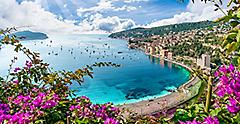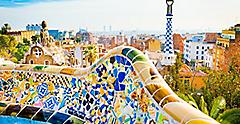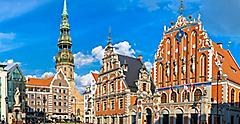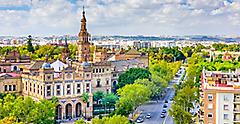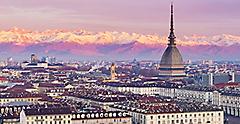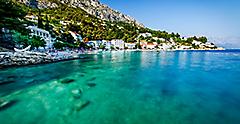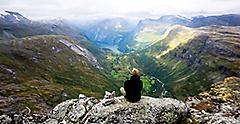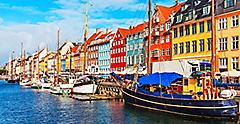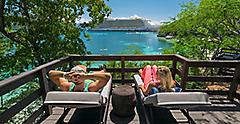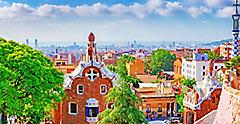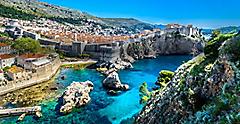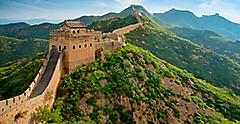By Robert Schrader | Published on January 4, 2024
Enjoy The Tourist Trail — And Go Off The Beaten Path
European ports like Barcelona, Venice and Santorini are popular for a reason. There's no shame in feeling a thrill as you enter into the Sagrada Família, as you ride a gondola along the Grand Canal or as you watch the sun set into the Aegean behind the iconic white houses of Oia village. The most famous destinations offer so much to see and make for an exciting vacation cruise.
That said, peppering underrated travel destinations into even a European itinerary can take your trip to the next level. For example, you might follow up a couple of days amid the history and nightlife of Berlin with an excursion to Dresden, a city in former East Germany, whose Baroque Zwinger palace is more ornate and opulent than virtually anything in the capital, whose comparative grunginess you'll appreciate by contrast. The same can be said for visiting Bratislava, Slovakia, after Vienna or Brussels after Amsterdam.
This can be an effective strategy for veteran Europe travelers who may take the experience of certain places for granted. If I'm traveling in a smaller country like Portugal, for example, I'll sometimes start in a mainstream city like Lisbon or Porto, and then arrange my trip so it ends there. After exploring smaller cities like Evora and Coimbra, which are admittedly amazing in their own way, the scale of architecture, cuisine and history in established tourist meccas seems all the more impressive.
Now, if you're browsing the best cruises to Europe, there are two basic ways you can try to apply this to your own travels. The first is to select a cruise itinerary that builds both the tourist trail and destinations off the beaten path into its trajectory. For example, you could cruise from Rome to Athens and stop at lesser-known ports like the Greek island (and budding outdoor adventure hub) of Crete and Kusadasi, Turkey, which sits near the ruins of Ephesus.
The other approach is to plan to arrive a few days before your cruise or to stay a few days after your ship returns to port. I generally prefer staying late rather than arriving early, but it's totally up to you. This is particularly effective if you happen to choose a cruise that prioritizes big-ticket destinations. This will leave you curious and energized to discover nearby hidden gems whether they're excursions from the city where you finish up, or somewhere completely far-flung.
See Different Sides Of Spain, France And Italy
Just because a country is well-known doesn't mean every city or region in it is — Spain is a great example of this. After a cruise that ends in Barcelona, for instance, you can travel by train, bus or domestic flight northward to Bilbao, capital of the Basque Country, a Spanish region that has its own language and even its own kind of tapas (known as pinxtos, or "peen-chos"). Here, you can pair a morning in the coastal idyll of San Sebastián with an evening at Bilbao's avant-garde Guggenheim Museum as it lights up for the night.
Another option is to head westward into Andalusia, which was under the control of the Moors for centuries. Today, Andalusian cities like Granada and Seville boast culture, cuisine and even siesta customs that seem of another world entirely. These cities (and others, such as Cadiz and Jerez de la Frontera) have become more popular choices for European vacations in recent years. However, with many more unexplored streets and unseen vistas than Barcelona or Madrid, a visit here can be more satisfying than those cities in some ways.
This is also true in Italy, which is actually a pretty undiscovered country off the main tourist trail. While you can reach the city of Turin (Torino) in under two hours from Milan by high-speed train, what you find there is totally unexpected. After admiring the surreal Mole Antonelliana spire with the Alps towering behind it, you can sit down for a legendary cup of Lavazza, an espresso that originates in the surrounding Piedmont state.
This is just in Italy's north! Many of the best European cruises are now stopping in Naples, a misunderstood city at the foot of Mt. Vesuvius, which is the gateway not only to ancient Pompeii but also to the lush Amalfi Coast. Ditto for Sicilian ports like Palermo and Catania, from which you can easily hop on a train and explore exciting spots like the ruins of Agrigento, the beaches of Cefalù and Taormina, a stunner at the base of Mt. Etna.
France, the world's most-visited country in 2019, is also a hotbed of undiscovered gems, many of them easily accessible. Call in Nice and take a day trip to Marseille, a larger city whose old port will nonetheless make you feel like you're in an 18th-century mystery novel. Or, if you find yourself in northern France, ride a TGV train from Paris to Nantes, where you can rent a car and explore the enchanting small towns of Brittany, including Quiberon and Saint-Malo, as well as the storied Mont-St-Michel monastery.
Don't Sleep On The Balkans
The Balkan peninsula, which sits between Italy and Greece, is one of Europe's most interesting emerging regions. On one hand, you have countries like Croatia and Slovenia, whose popularity among Europeans (and adventurous Americans) has brought them more or less into the travel mainstream. This is true for Croatia in particular, where ports like Split and Dubrovnik are bona fide cruising hubs.
Yet the Balkan region is still full of underrated places to travel, some of which are landlocked. Or almost landlocked like Bosnia, which technically has a small strip of coastline. Bosnia is easy to explore before or after a cruise in Croatia. You can rent a car or ride a bus to the town of Mostar and its famous bridge or to Sarajevo, whose old town seems frozen in the early 20th century when it unwittingly became the scene of the episode that started World War I.
The farther south you go, the fewer tourists you find, even though the scenery gets even more beautiful and the cities more storied. Albania's beaches are so gorgeous, in fact, that the tiny country's coastline has been nicknamed "The Albanian Riviera." Whether amid the crystalline waters of Dhërmi or in Durrës where a Roman amphitheater towers behind the sea, you'll have a hard time remembering that you're not in Italy or Croatia.
Although not as many cruises call there as in the Med, you should also make sure not to forget the Black Sea countries of Romania and Bulgaria. Romania in particular is an eclectic destination. Get off the ship in Constanta then head to Bucharest, Romania's underrated capital or to Brasov, the gateway to Transylvania. You can be in Dracula's (alleged) castle within less than a day of your cruise ending!
Bulgaria has certainly earned its place as one of the most fascinating underrated travel destinations in Europe. Seaside cities like Burgas and Varnas bear so much resemblance to more famous shorelines like Lake Como or Lago Maggiore that they sometimes substitute for them in movies! Further inland, the national capital of Sofia (and the budding tourist capital of Plovdiv) pair pristine Orthodox churches with adventurous restaurant and nightlife scenes.
Europe Holds Many Surprises
It's not surprising that many of the best European cruises (or at least the most popular ones) explore the Mediterranean, Aegean and other warm seas. Many Americans book cruise travel around Thanksgiving or Christmas when cold local weather makes summer in Italy or Greece seem like the only way to go. Even though I empathize with this sentiment, I urge you to consider destinations farther north!
Some of these cruises can call in utterly underrated countries, such as the Baltic States of Lithuania, Latvia and Estonia. Here, you'll find certain destinations that seem quasi-familiar, such as capital cities like Riga and Tallinn, which almost feel like alternate versions of cities elsewhere in Northern Europe. Others are relatively unprecedented. The sandy beaches along the Curonian Spit near Klaipeda, Lithuania, are so white they almost seem Caribbean, even though the water is so dark and cold it could only be Baltic.
Others are slightly more mainstream, calling in Scandinavian capitals like Helsinki, Stockholm, Copenhagen and Oslo. Or along the west coast of Norway, namely in the city of Bergen, the one from which the country's famous fjords are the most accessible. One of my favorite options from here is to take a few days to fly north, particularly to the city of Tromsø or to the Lofoten Islands. Popular spots for peeping the aurora in winter, these are some of the best exemplars of summer's Midnight Sun.
Keep in mind that while these underrated vacation spots are colder, on the whole, than countries in Southern Europe, they aren't always objectively chilly. This is especially true if you cruise in July or August, when daytime temperatures can reach 80ºF or even higher, even in northern Scandinavia. Coupled with the sun that predominates around this time of year, your "cold country" cruise can feel downright subtropical!
You should also make sure not to forget Northern Europe's island countries. Whether you choose a cruise that calls in Belfast or Reykjavík or rent a car post-cruise and road trip through the Scottish Highlands or around Iceland's Ring Road, the cultures and landscapes that have arisen in Europe's most isolated places are also some of its most unique.
Get Royal Deals, Sign Up Today

Getting There
Explore Our Most Affordable Itineraries
Discover everything Europe has to offer on a European cruise.
Related Articles

Western Caribbean Family Vacation Ideas: Icon of the Seas | Royal Caribbean Cruises
READ MORE

Eastern Caribbean Family Vacation Idea | Royal Caribbean Cruises
READ MORE

Perfect Summer Getaways with Family
READ MORE
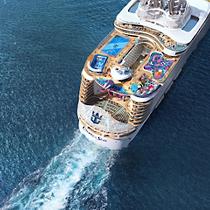
What's Free on Utopia of the Seas | Royal Caribbean Cruises
READ MORE

